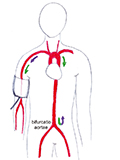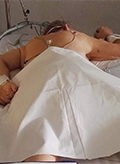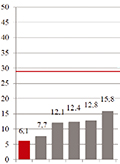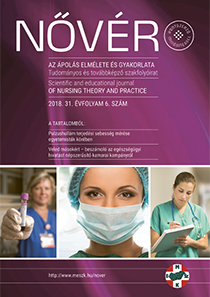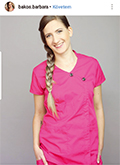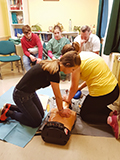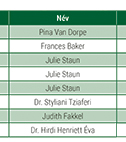The eLitMed.hu medical portal uses computer cookies for convenient operation. Detailed information can be found in the Cookie-policy.
Journal of Nursing Theory and Practice - 2018;31(06)
Content
[Pulse Wave Velocity measurement among university students ]
[The aim of the study: The purpose of our investigation is to prove the favorable effect of regular physical activity on arteries. Material and method: 42 students (29 women; 13 men; age 24 ±2,71 years) volunteered for our research. Anthropometric data, segmental-, visceral body composition (TanitaSBCA) and arterial stiffness parameters (Arteriograph) were measured. Participants took part in an 8-week training. Interventional-group: started training during our research, control-group: doing sports constantly for years. Results: Compared to the age decadal artertial pulse wave velocity (PWVao) reference value both groups showed significant difference. PWVao significantly improved because of training by the interventional group (6,23±0,79; 5,87±0,59 p<0,01); while in the case of the control group there was no significant change (5,85±0,54; 5,87±0,63 p=0,80). The body composition data showed minimal correlation with PWVao. Conculsion: Regular training has favorable effect on one stiffness parameter of arteries. Already 8 weeks enough to reach significant change to reduce arterial stiffness and this condition can be maintained with long-term regular training.]
[Treatment and nursing of patients placed in prone position]
[Acute respiratory distress syndrome (ARDS) is a medical condition characterized by a high mortality rate. ARDS may be triggered by various pathologies such as sepsis and can have a significant impact on the overall outcome of primary disease. Prone positioning as a supportive strategy in the treatment of ARDS that has been investigated since 1974. Lying face down has become more and more popular because it might have helped to improve oxygenisation in 70 percent of patients with ARDS. Occurence of ARDS did not change in the last 10 years in Europe and the syndrome is still associated with a quite high death rate between 40-50% despite of technologic and therapeutic improvement of last decades. It has already been investigated whether prone positioning may increase survival in patients with ARDS. However, approaches to the exact use of position are often occasional. Guideline development would be crucial to emphasize beneficial effect of prone positioning in patients suffering from ARDS and describe the process by which the manoeuvre may be performed. Primarily, it is substantial to improve oxygenation through the use of the prone position whilst promoting patient safety. Complications can be minimized by using a predefined strategy of placing patients in a prone position and a related checklist. ]
[Judgement of organ donations’ nursing-related problems by nurses in the light of a Hungarian survey ]
[Aim of the study: The research aims to map the opinions of nurses working on transplantation wards about the preparedness of laic people in relation to the theme of organ donation. In addition, we wanted to examine whether nurses give preference to religious beliefs and ethical principles against legal regulation. We also wondered whether nurses working on transplantation wards would offer their own organs. Materials and methods: The descriptive study was conducted among transplant nurses in Budapest, Szeged and Pécs, using a self-constructed questionnaire. Our results were obtained using a Pearson’s Chi-square test (all statistically significant levels were set at P<0.05), as well as using the one sample t-test. Results: The total sample size was 37. According to nurses, the laic population does not have the sufficient knowledge about the current legal rules. Nurses are positively committed to offering their own organs for a possible donation. In relation to organ donation, nurses prefer the religious and ethical principles against legal rules. Conclusions: The laic population is not fully aware of organ donation, which puts the success of organ donation at risk. It would worth to involve transplant nurses into the education of the laic population to improve the general acceptance of organ donation who work in transplantation fields and who do donor care, so laics would be more accepting and less conflict would occur, supposedly more organ transplants would occur.]
[Challanges in transcultural nursing in the clinical practice]
[The aim of the authors is to call attention to the differences arising during nursing of patients of different culture. Regarding to the fact that in our healthcare system there are more and more patients with foreign customs, it is inevitable for the healthcare staff to acquire new knowledge and apply it during their work in an effective way. ]
1.
Clinical Neuroscience
Is there any difference in mortality rates of atrial fibrillation detected before or after ischemic stroke?2.
Clinical Neuroscience
Factors influencing the level of stigma in Parkinson’s disease in western Turkey3.
Clinical Neuroscience
Neuropathic pain and mood disorders in earthquake survivors with peripheral nerve injuries4.
Journal of Nursing Theory and Practice
[Correlations of Sarcopenia, Frailty, Falls and Social Isolation – A Literature Review in the Light of Swedish Statistics]5.
Clinical Neuroscience
[Comparison of pain intensity measurements among patients with low-back pain]1.
Clinical Neuroscience Proceedings
[A Magyar Stroke Társaság XVIII. Kongresszusa és a Magyar Neuroszonológiai Társaság XV. Konferenciája. Absztraktfüzet]2.
3.
Journal of Nursing Theory and Practice
[A selection of the entries submitted to the literary contest "Honorable mission: the joys and challenges of our profession" ]4.
Journal of Nursing Theory and Practice
[End of Life and Palliative Care of Newborns in the Nursing Context]5.
Journal of Nursing Theory and Practice
[Aspects of Occupational Health Nursing for Incurable Patients ]